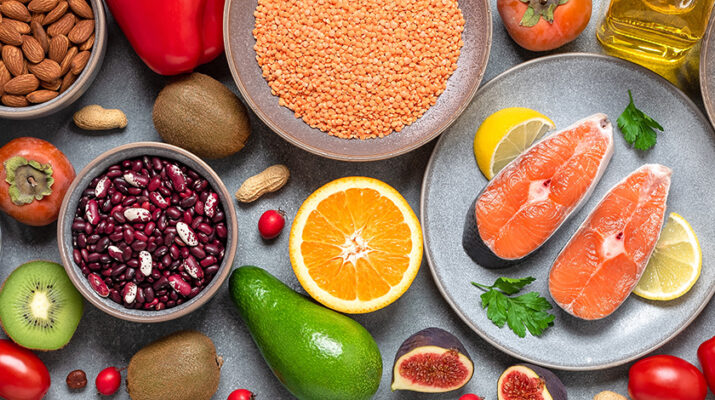By Amanda Jowsey
Trying to plan healthy meals to give us the most nutritional bang for our buck feels more crucial and daunting than ever.
Food prices rose by almost 10% from 2021 to 2022, according to the United States Department of Agriculture.
Easily get some extra nutritional value from your next trip to the grocery store with this list of my five favorite superfoods, reviewed by a local nutrition expert who helps to explain some of the health benefits — and dispel some of the myths — surrounding these amazing foods.
1 — AVOCADO
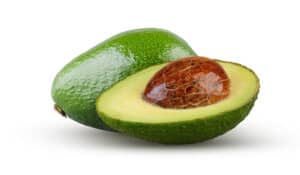 I didn’t discover these “alligator pears” until later in life and I don’t know how I lived without them! They are mildly flavored and incredibly nutritious and diverse.
I didn’t discover these “alligator pears” until later in life and I don’t know how I lived without them! They are mildly flavored and incredibly nutritious and diverse.
I know, they’re not the cheapest, but one bag will go a long way. Use them for guacamole, tacos, burgers and sandwiches, eggs and toast or even throw one in your next smoothie to make it creamier and more nutritious.
Danielle Meyer talked about the general health benefits of avocado, saying they are an excellent source of good fat, which promotes healthy cholesterol.

Meyer is a registered dietitian and a board-certified specialist in oncology nutrition at the UB’s Department of Exercise and Nutrition Sciences and School of Public Health and Health Professions.
“Avocados are an excellent source of [monounsaturated fatty acids]. These are the same good fats we find in olive oil. Monounsaturated fatty acids can help with our heart health as they can lower our LDL [lousy or bad] cholesterol. Having your LDL cholesterol in a healthy range can help reduce your risk of heart disease and stroke,” Meyer said.
Avocados also contain anti-aging properties that can help you maintain a youthful, glowing appearance. A recent study published in The Journal of Cosmetic Dermatology found that regularly eating avocados — one avocado daily for eight weeks — is linked to increased skin elasticity and firmness in women.
Avocados are also gluten free, dairy-free, vegan and vegetarian, making them an excellent replacement for certain products like butter, mayo, sour cream, olive and coconut oil and even peanut and almond butter.
2 — Sweet Potato
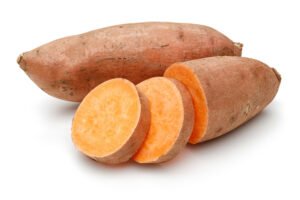 Highly nutritious and loved by kids and adults, sweet potatoes are a strong source of vitamin A, vitamin C, beta carotene, potassium and fiber.
Highly nutritious and loved by kids and adults, sweet potatoes are a strong source of vitamin A, vitamin C, beta carotene, potassium and fiber.
“Sweet potatoes are high in beta-carotene, a carotenoid [a type of phytochemical that is considered an antioxidant] that gives the sweet potato its color. Having a varied eating pattern that includes carotenoid-rich vegetables has been associated with reducing the risk of cardiovascular diseases and some cancer,” Meyer said.
Sweet potatoes may boost brain function and prevent cognitive decline. According to the NIH, people who eat a diet rich in fruits and vegetables that contain antioxidants are 13% less likely to experience mental decline and dementia.
Some claims suggest that consuming avocados can promote a healthy mind-body connection, but this connection “is still in its infancy of understanding,” Meyer said.
“The way food makes us feel, or the way we feel when we eat foods we view as healthy, can improve our mood, but it is not always related to the food itself. It can also be that we acknowledge we are doing something good for ourselves and that in turn makes us feel better. There are also many other sources, more economical ones, that offer the same health benefits,” she added.
Sweet potatoes can promote healthy gut functioning because of their soluble and insoluble fiber content. Fiber-rich diets have been linked to a lower risk of colon cancer and more digestive regularity. The antioxidants in sweet potatoes also promote the development of a type of gut bacteria that is associated with a lower risk of gastrointestinal disease.
3 — Nuts & Seeds
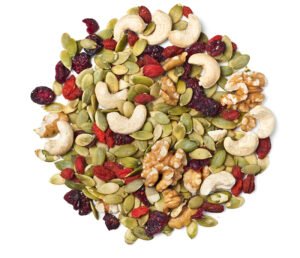 They make a great snack just as they are (with cheese and fruit), can be used as toppings on ice cream and salads or can be used as a replacement for breadcrumbs in certain recipes.
They make a great snack just as they are (with cheese and fruit), can be used as toppings on ice cream and salads or can be used as a replacement for breadcrumbs in certain recipes.
They are a great source of fat, fiber, protein, and vitamins and minerals, and provide a well-rounded boost of nutrition for the body. Their unsaturated fat content can help protect against heart disease and lower the risk of obesity.
They can boost cognitive function, enhance memory and attention, improve mood and reduce the risk of depression. A recent study published in The Nutrition Reviews Journal by Oxford Academic suggests “that higher nut consumption could be associated with a lower risk of depression, fewer depressive symptoms, and better mood state in the general population.”
4 — GARLIC
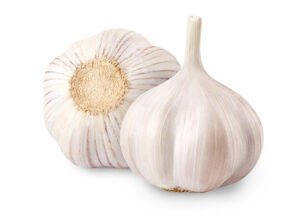 You either love it or you hate it, but garlic is one of the most amazing foods.
You either love it or you hate it, but garlic is one of the most amazing foods.
It contains vitamin C, vitamin B6 and manganese (a coenzyme that helps break down carbs, proteins and cholesterol). Vitamin C is required for the growth, development and repair of all body tissues. Vitamin B6 helps to maintain a healthy brain function as well as a strong immunity.
In one randomized study, a daily garlic supplement reduced the risk of the common cold by 63% compared to a placebo. Another recent study suggests that consuming a high dose of garlic extract reduced the length and severity of illness with the cold or flu by 61%.
Several studies have confirmed that garlic supplements may also significantly reduce blood pressure in those suffering from hypertension. One study even found that garlic extract is as effective in treating hypertension as Atenolol, a commonly prescribed blood pressure medication.
5 — BLUEBERRIES
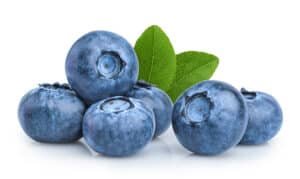 Although I do admit, their sometimes inconsistent and unpredictable ripeness is not my favorite; they still deserve a shout out. These tiny berries are jam-packed with nutrition, containing some of the highest levels of antioxidants of any fruit.
Although I do admit, their sometimes inconsistent and unpredictable ripeness is not my favorite; they still deserve a shout out. These tiny berries are jam-packed with nutrition, containing some of the highest levels of antioxidants of any fruit.
Think high nutrients, low calories. One cup of blueberries provides the following recommended daily intake of vitamins and minerals: vitamin C 24%, vitamin K 36%, manganese 25% and dietary fiber 14%.
They may also help to manage blood sugar, lowering the risk of heart disease. High fiber, lower sugar fruits like blueberries prevent insulin levels from rising too high which can promote a healthy endocrine system. They have also been shown to improve symptoms and lower blood pressure in those with metabolic syndrome (NIH).
Meyer wants readers to remember: “Superfood is a marketing term. Eating your favorite fruits and vegetables will give you the same benefits. Including a variety of colorful foods into your everyday eating pattern can help in numerous ways. This can be accomplished on a budget by purchasing frozen fruits and vegetables year-round and purchasing them in season when you have the option.
“Since all fruit could carry the moniker of a ‘superfood,’ one of the most cost-efficient ways of including these in your diet is to purchase frozen fruit. These are often picked at peak ripeness and there is no rush to for them to go bad waiting for you to use them. Many fresh fruits are picked just prior to ripening to allow for transportation time. Frozen is an excellent option for the best tasting fruit options year-round,” Meyer said.

